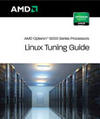Warewulf Cluster Manager – Part 3
The Warewulf cluster is ready to run HPC applications. Now, it’s time to build a development environment.
Exploring AMD’s Opteron 6200 Series Linux Tuning Guide
A tour through AMD’s Opteron 6200 Series Linux Tuning Guide provides a practical look at some important HPC startup tasks.
Parallel Julia: Part 2
The Julia language is a very powerful parallel computing model that works across multiple cores and cluster nodes.
Warewulf Cluster Manager – Part 2
Installing and configuring Warewulf on the master node and booting the compute nodes creates a basic cluster installation; however, a little more configuration to the master remains and a few other tools must be installed and configured for the Warewulf cluster to become truly useful for running HPC applications.
Julia: A New Language For Technical Computing
Can this new language deliver on bold claims of fast, easy, and parallel?





